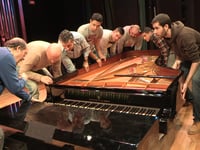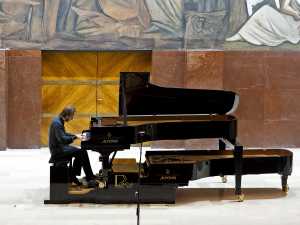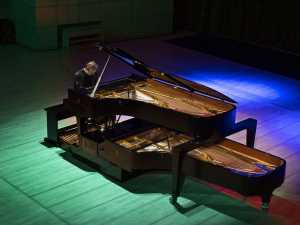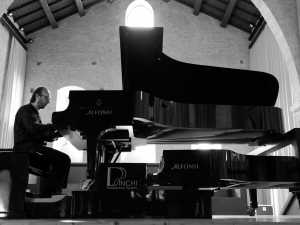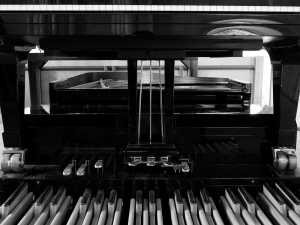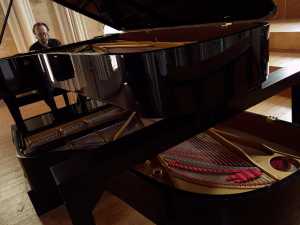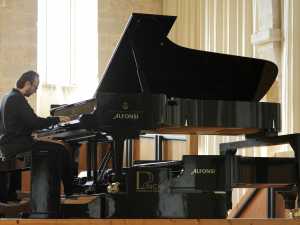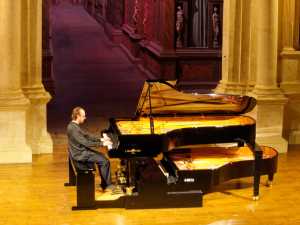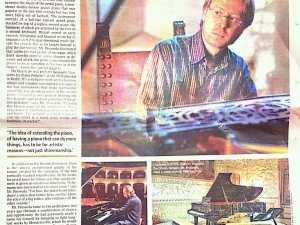Pedal piano
Since September 2011, Roberto Prosseda has given regular concerts on the pedal piano (also known as piano-pédalier or Pedalflügel), an instrument much loved by Mozart, Schumann and Alkan, which fell into disuse at the beginning of the 19th century and has been resurrected by Prosseda. On 20 April 2012, the Wall Street Journal published a full page article about the re-discovery of the pedal piano and the repertoire (Mozart, Schumann, Alkan, Gounod).
Prosseda has commissioned a special pedal board from organ builder Pinchi, which can be attached to 2 pianos, so that a pedal piano can effectively be created in any concert hall with minimal transport costs. The Pinchi Pedalpiano system has an extension of 5 octaves and 3 registers (16’, 8’, 4’), which gives the pedal piano a great variety of timbre and richness of sound. The Pinchi Pedalpiano System can be assembled to two grand pianos of any brand in less than one hour.
Several composers wrote new music for pedal piano dedicated to Roberto Prosseda. Among them, there are Michael Bakrnčev, Nimrod Borenstein, Nicola Campogrande, Luca Lombardi, Giuseppe Lupis, Ennio and Andrea Morricone, Michael Glenn Williams.
Prosseda is currently the only one who gives regular public recitals and concerto performances with the pedal piano.
Repertoire for pedal piano and orchestra
Wolfgang Amadeus Mozart:
Concerto K 466 in D minor (reconstructed version for pedal piano by Francesco Finotti).
Charles Gounod:
Concerto in E flat for pedal piano and orchestra (1889)
Suite Concertante for pedal piano and orchestra (1888)
Danse Romaine for pedal piano and orchestra (1885)
Phantasie sur l'Hymne Russe for pedal piano and orchestra (1886)
Cristian Carrara:
Magnificat for pedal piano and orchestra (2011)
Pedal piano recital selected repertoire
Bach: Passacaglia in C minor BWX 582 für zwei Claviere mit Pedal
Mozart: Fantasia in F minor K 608 for mechanical organ
Schumann:
6 Etuden für den Pedalflügel op. 56
4 Skizzen für den Pedalflügel op. 58
Boëly: Fantaisie et Fugue op. 18 n. 6 pour piano-pédalier
Liszt: Fantasy and Fugue on the chorale "Ad nos, ad salutarem undam" für Pedalfügel
Alkan:
Benedictus op. 54 pour piano-pédalier
Impromptu op. 69 pour piano-pédalier
13 Prières op. 64 pour piano-pédalier
3 Etudes pour les pieds seulement
11 Grands Préludes op. 66 pour piano-pédalier
Gounod: Marche Funèbre pour une Marionette (version for piano-pédalier by Giuseppe Lupis)
E. Morricone: Studio IV bis per piano-pedaliera (2011)
A. Morricone: Hommage à JSB (2011)
N. Borenstein: Fireworks (2012)
N. Campogrande: Corale & Pedmix (2013)
M. G. Williams: Tip-Tap (2012)
G. Lupis:
8 Variations on "Ah vou dirai je, mamam" (2012)
Variazioni di bravura per sola pedaliera (2012)
Michael Bakrnčev:
4 pieces:
I: Let The Sun Shine
II: Dusk
III: Melody
IV: Earth Dance
Press reviews
'Playing Heart, Soul and Feet'
Italian pianist Roberto Prosseda revives a lost art, recreating the haunting melodies of a pedal piano. The Italian pianist is on a one-man mission to revive the music of the pedal piano, a monstrous double-decker grand piano that was popular in the late-19th century but has long since fallen out of fashion. In addition to the theatrical element, there is the almost architectural quality of the sound, created by the interplay of the two vertically stacked soundboards. In the works for pedal piano by Schumann, that spatial element is given an emotional dimension. [...]
Corinna da Fonseca Wollheim, The Wall Street Journal, 20/4/2012
'Excellent performances'
BBC Music Magazine
The Guardian
 PERFORMANCE
PERFORMANCE RECORDING
RECORDINGDeshalb sind auch die Etuden op. 56 und die Skizzen op. 58 von Robert Schumann eher diskrete Experimente mit ein paar zusätzlichen Grundtönen. Doch danach legte Roberto Prosseda mehr Wert auf den pianistschen Überbau. Bei einer Uraufführung von Luca Lombardi eighte er, mit Themen von Mendelssohn und jüdischen Melodien, subtilen Piano-Minimalismus sowie dramatische Fort-Cluster-Gewitter als Schreckensbeschwörungen von Aushwitz. Auf diesem Weg zeighte Prosseda sämtliche Möglichkeiten seines Instruments. Zum Höhepunkt wurde jedoch der alte Klaiertitan Liszt - ohne Pedal, nur mit ein paar sparsamen Basstönen als Verstärkung der orchestralen Fantasien. In der gewaltigen Dante-Sonate nach Sonetten von Petrarca spielte Prosseda alle Register von Liszts Klavierkünsten aus, sein unermüdliches Narrativ, die thetorische Überwältigung, die facettenreiche Tonmalerei un das wogende Aud- un Ab gestischer Beschwörungen. Nach so viel Piano pur blieben nur noch zwei Zugaben von Alkan und Gounod für die Demonstration der exotischen Pedalkünste an diesem Abend.
Suddeutsche Zeitung, 16/2/2015
Oggi l'unico grande interprete che ha accettato fino in fondo la sfida del Pedal Piano è Roberto Prosseda, che ne è diventato l'alfiere. I risultati sono eccellenti, perché Prosseda è in grado di unire il senso della misura e dell'ordine, pulizia, chiarezza e precisione ad una rara sensibilità per il fraseggio e ad un serio lavoro di scavo interpretativo. Il vigore dell'interpretazione dell'Op. 58 schumanniana lascia senza fiato, sia per il dominio tecnico, sia per lo slancio emotivo: sembra di assistere all'entrata in scena di Florestan, uno dei due "alter ego" del compositore, quello più appassionato e passionale. Così avviene per l'Op. 56, sottratta da ogni lusinga salottiera e calata nel fuoco vivo del Romanticismo. Prosseda esibisce un legato di ottima fattura e pianissimi calibrati con sapienza anche nella Fuga di Boëly, i cui dettagli sono tutti perfettamente a fuoco. Per non dire del Benedictus di Alkan, una pagina emozionante, resa con un fraseggio di grande respiro. Lo Studio e i Preludi di Alkan sono travolgenti per il vigore drammatico e virtuosistico, mentre la Marcia Funebre di Gounod è gustosamente grottesca.
Musica, Luca Segalla, 1/2015
El piano-pédalier tuvo una discreta difusion a lo largo del siglo XIX e interesò a compoisitores come Schumann, Liszt, Aklan y Gounod. Este ultimo escribio cuatro partituras para piano-pédalier y orquesta tras conocer a Lucies Palicot, virtuosa del instrumento. Roberto Prosseda lleva algun tiempo dedicandose a la recuperacion de este repertorio olvidado y lo hace con resultados brillantes.
Stefano Russomanno, ABC Cultural, 2/3/2015
photosdownloadable documents

